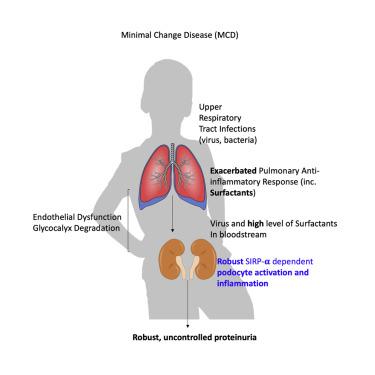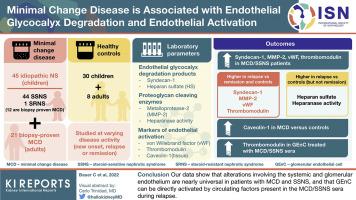Lab Overview

Richard J Johnson, MD is ll Professor of Medicine in the Division of Nephrology and Hypertension at the University of Colorado. For more than 20 years, the Johnson laboratory has studied the underlying mechanisms driving kidney and metabolic disease. Current areas of study are as follows:
1. The Cause of Minimal Change Disease. Minimal chan ge disease remains the most common nephrotic syndrome in the world and especially in the pediatric population but the cause has remained one of the unsolved mysteries of nephrology. It is known to be driven by a circulating factor, but exactly what the factor is and how it causes the condition is unknown. Most emphasis has been on the podocyte, as it seems the primary target in the disease. However, work in this laboratory, led by Dr Gabriela Cara Fuentes (pediatric nephrology), has found a new role for the endothelium in causing the disease. Here the laboratory is looking at a pathway that initiates in the lung, releasing circulating factors that activate the endothelium and podocyte. Much of the focus is on a specific factor released from endothelial cells known as CD93. Studies include cell culture, animal models, human sample testing, and potential human clinical trials.
2. The Epidemic of Chronic Kidney Disease of Unknown Etiology in Agricultural Communities. There is an epidemic of chronic kidney disease in Central America (along the Pacific Coast), in the Vera Cruz region of Mexico, in Sri Lanka, and in India. It is primarily occurring among young men working manually in agricultural communities, and it is associated with some of the highest rates of end-stage kidney disease in the world. Our group, led by Carlos Roncal, has been studying the etiology over the last 10 years and our work focuses on the role of climate change and heat stress as etiologic factors. However, we also have some evidence for the role of toxins, especially silica ash from the burning of sugarcane. Projects include
Studies of animal models of CKDu (work with Carlos Roncal in the Johnson laboratory). Currently we are evaluating models of nephropathy driven by silica nanoparticles and their interaction with heat stress.
Studies analyzing silica content and analysis of human biopsies of CKDu and other kidney diseases. This is being done with both Scott Lucia MD (renal pathologist) and with Carlos Roncal and biopsies are being provided from multiple sites around the world.
Cell culture studies evaluating how silica and heat cause tubular injury (done in collaboration with Jared Brown in Toxicology).
Collaboration with clinical studies done at a sugarcane plantation in Guatemala (studies with Lee Newman in the School of Public Health)
3. Studies on the Etiology of Sarcopenia in Chronic Kidney Disease Patients. A vexing problem in the management of CKD is that individuals with CKD often demonstrate accelerated aging and sarcopenia, and muscle wasting and weakness are a hallmark in the end stage kidney disease patient. Our group and others have found evidence that this is mediated by a proinflammatory state that leads to mitochondrial loss and low intracellular energy, and we have identified a pathway activated by the degradation of ATP that might be responsible. Specifically, blocking this pathway results in blockade of sarcopenia and normal strength in kidney disease. Currently our studies involve investigating the role of AMP deaminase 1 and uric acid using animal models of kidney disease, with investigation of cellular pathways with cell culture.
4. Role of fructose and uric acid in Kidney and Metabolic Disorders. The laboratory is also exploring studies investigating the role of fructose and uric acid in a wide range of metabolic disorders, including the pathogenesis of hypertension, diabetes, CKD, fatty liver and other conditions. We are also evaluating a novel role for fructose in alcoholism. Studies include animal models and cell culture.
5. Role of Acetylcholine and Host Anti-Inflammatory Factors in Glomerulonephritis. Inflammation is a key player in kidney disease, but very little is known about the endogenous anti-inflammatory factors and how they also can regulate disease. Work led by Gabriela Garcia has recently focused on the role of acetylcholine as an anti-inflammatory and protectant in kidney disease. Dr Garcia has found that podocytes can make acetylcholine and that is production can modify the course of glomerular disease. Studies include animal models and cell culture.





